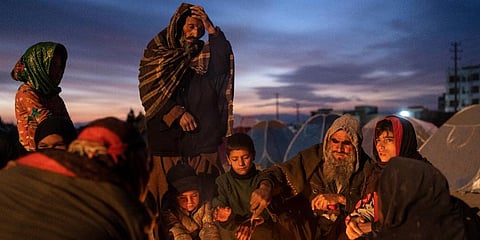

KABUL: Afghan mass exodus post the Taliban took control of the war-torn nation in mid-August, a tale of two friends describes the hope and despair - one who escaped, while the other trapped in Afghanistan.
Eliza Mackintosh and Nilly Kohzad, writing in a series on gender inequality "As Equals" in CNN described the anguish of Nilofar, a 20-year-old university student and her friend Florance, a 23-year-old Kabul University graduate.
Both of them shared their hope and despair on WhatsApp. Nilofar, who grew up in the shadow of the US invasion that toppled the Taliban in 2001, has lived in an increasingly open society -- one defined by cellphones, social media, reality television, pop music and the right to express themselves freely. They've endured war, persistent poverty and the threat of suicide bombings. But they came of age with an increasing sense they could break free of the patriarchal society of the past and decide their own future, said Mackintosh and Kohzad.
"I had many dreams, I wanted to continue my education, to do big things, to work alongside my friends, but all my friends left the country. I don't know if Afghanistan can return to its previous state," Nilofar said, adding that she has received a UN scholarship to attend university in Kazakhstan, but is still waiting on her visa to be approved.
Nilofar said that she is determined to follow friends who fled in a frenzy of evacuation flights during the withdrawal of US and NATO troops, and as the Taliban swept into the capital on August 15.
"We still try to stay alive and occupy ourselves so that we don't feel the pain and hurt," Nilofar told CNN in a recent phone call. "We don't even know what's going on outside. We simply watch the sunrise and set outside the window."
Nilofar's best friend, Florance, is now living in temporary housing in a Paris suburb, where she is trying to learn French and planning to apply for her master's degree in business. She said that she was heartbroken to leave Afghanistan, but felt there was no future for her there.
"I left my motherland, my home, my mother, my sister, my brothers, my beloved little nephews, my memories, my friends, with tears," she said.
The last time she saw Nilofar was two weeks before the Taliban takeover, during an English language course that they'd taken together for four years with the hope of travelling abroad, said Mackintosh and Kohzad.
"We were just like sisters. We did everything together," Florance said. "We had lots of fun, but now I miss all of those things."
WhatsApp messages between Nilofar and Florance -- who asked that their last names not be published for their safety -- provide a view into the anguish of a generation of Afghan girls that have seen their freedoms disappear overnight. Now facing a deteriorating economic crisis, many are desperate to leave.
For the women who remain in Afghanistan, life has been stuck in a perpetual state of limbo.
Despite the Taliban's promises that women and girls would continue to have access to education, many across the country haven't been allowed to return to secondary schools. Those that have resumed university classes are separated by a curtain from their male peers.
Restrictive rules like a stay-at-home order, which was touted as being temporary, have dragged on. Most women still can't go back to work, having been barred from an array of jobs, including in government and entertainment television.
Young women interviewed by CNN described a sense of being adrift in a waking nightmare.
"My parents would tell us many stories about the Taliban ... so we have this strong nightmare within us," Nilofar said. "I can't believe we are living under their flag now; life has become so difficult for us ... Besides sitting at home, we cannot do anything. Our stress levels are very high."
As their physical world has narrowed, young Afghan women have turned increasingly to social media as an outlet to share their anxieties over private voice notes, Instagram DMs and posts with friends, reported CNN.
"Nowadays, we're only connected by WhatsApp, and we talk about memories, but mostly we talk about the situation in Afghanistan. My friends who are still in Afghanistan, they're really depressed," Florance said.
She is trying to support Nilofar and other friends, who are seeking legal routes out of the country, but is often unsure how to advise them, said Mackintosh and Kohzad.
It is that sort of despair that laces the WhatsApp conversations between Nilofar and Florance, which have waned in recent weeks and months. Between the time difference and settling into their new routines, it's become more difficult to talk. Both say they hope to see each other soon but are unsure when that might be.
"We aren't talking as much as we used to. I know she is busy, she has just started taking French courses and she must become independent. That's why I don't try and bother her so much," Nilofar said. "But we stay connected, and I want to continue our friendship."